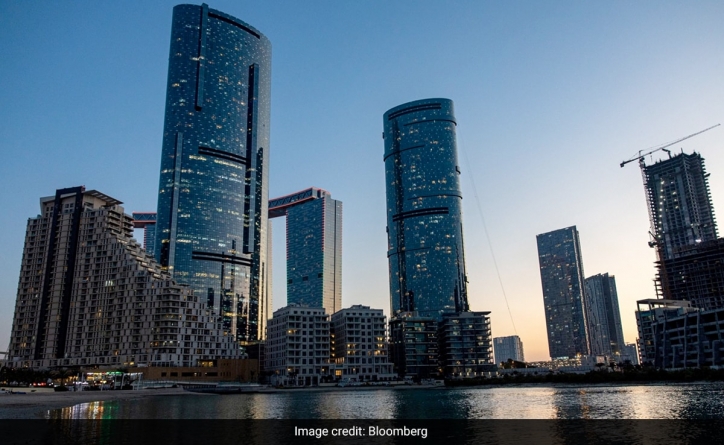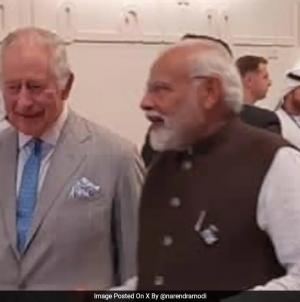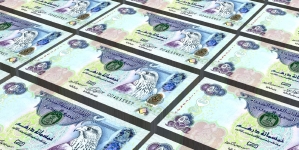-
WASHINGTON: India Now Second-Largest Source Country For New Citizens In US- Report - 18 hours ago
-
LONDON: Indian-Origin Teen In UK Gets “Life-Changing” Cancer Treatment - April 25, 2024
-
SILICON VALLEY: All About Pavan Davuluri, New Head Of Microsoft Windows - April 25, 2024
-
LONDON: UK’s India Gate To Commemorate Role Of Indian Soldiers From World Wars - April 24, 2024
-
HARARE: Shri Bramha Kumar appointed as the next Ambassador of India to the Republic of Zimbabwe - April 23, 2024
-
LONDON: Indian-Origin Principal Wins UK Legal Challenge Over School Prayer Ban - April 23, 2024
-
TORONTO: Indian-Origin Doctor Needs ₹ 2 Crore For Legal Fees. Elon Musk Responds - April 22, 2024
-
KINSHASA: India-Democratic Republic of Congo Foreign Office Consultations - April 21, 2024
-
LONDON: UK Court Allows Sale Of Nirav Modi’s Luxury London Apartment - April 21, 2024
-
TEHRAN: Travel advisory for Iran and Israel - April 20, 2024
DUBAI: Abu Dhabi Royal To Invest In Banker Rajeev Misra’s New $6.8 Billion Vehicle
DUBAI: As Gulf oil wealth flows to all corners of the globe – backing mega mergers, propping up economies and upending the world of sport – moves by a key member of Abu Dhabi’s ruling family have positioned him as one of the world’s most influential dealmakers.
Over the past few months, Sheikh Tahnoon bin Zayed Al Nahyan has gained control of the largest sovereign wealth fund in the United Arab Emirates, expanding the assets he oversees to almost $1.5 trillion. He’s proceeded to bankroll billions of dollars in deals via an expanded empire of private and state entities.
Drawing in titans of finance such as Rajeev Misra and billionaire Ray Dalio, Sheikh Tahnoon – one of Abu Dhabi’s two deputy rulers, the UAE’s national security adviser and brother to its president – has sought to invest in everything from technology to finance, with varying degrees of success.
Known to be a fan of Brazilian jiu-jitsu, cycling and chess, Sheikh Tahnoon now helms two wealth funds, the region’s most important private investment firm, the country’s largest lender and its biggest listed corporate. That’s made him the de facto business chief of the wealthy Al Nahyan family, with access to seemingly endless reserves of cash in OPEC’s third-largest producer – an unusual amount of financial firepower even in the oil-rich Persian Gulf.
Born in the late 1960s – a few years after oil was discovered in Abu Dhabi and when the UAE was still a backwater populated by fewer than 250,000 people compared with close to 10 million now – Sheikh Tahnoon is increasingly becoming the face of his country’s global aspirations.
“The UAE leadership has recognized its most important source of statecraft is financial,” said Karen Young, a senior research scholar at Columbia University’s Center on Global Energy Policy. “It has the economic means to secure itself, to project power and to shape the politics around it in ways that it could never achieve with its small size or military power alone.”
“Sheikh Tahnoon is now the strategist behind multiple economic statecraft tools and the ability to use economic means of foreign policy support,” she said.
Early considerations to buy Standard Chartered Plc and Lazard Ltd. at the start of this year, even though ultimately unsuccessful, highlight the scale of his ambitions.
Other prominent deals include an investment in TikTok Inc.’s Chinese owner ByteDance Ltd, a $10 billion fund targeting opportunities in tech, an agreement to bankroll Mr Misra’s new $6.8 billion vehicle and a takeover of Colombia’s largest food-maker in partnership with billionaire banker Jaime Gilinski.
Another of his main entities – G42 – is partnering with Cerebras Systems Inc., which recently built the first of nine AI supercomputers as an alternative to systems using Nvidia Corp. technology.
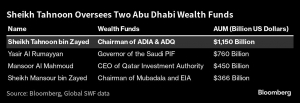
Despite the vast financial resources at his command, Sheikh Tahnoon’s entities have sometimes struggled to hammer out cross-border deals, like the one for Standard Chartered, due to difficulties navigating complex M&A regulations overseas. There are likely to be more challenges ahead.
Bankers and lawyers warn that some of Abu Dhabi’s investment vehicles could be slowed by national security reviews as the US Committee on Foreign Investment broadly conducts more stringent checks on deals by international investors with business ties to the Chinese government. The UAE is also set to join the BRICS grouping of major emerging markets, moving closer into Beijing’s orbit.
US deals have become more complex for Gulf entities, according to Lynn Ammar, an Abu Dhabi-based partner at law firm Cleary Gottlieb. “The broad geographic scope is likely to continue to attract attention from FDI authorities, such as CFIUS, who may be concerned about potential information flow to China,” she said.
Such added pressures come at a time when Sheikh Tahnoon’s investment vehicles are showing a particular affinity for emerging markets. G42’s tech fund is building teams in Asian cities, including Shanghai, to scout for investment opportunities, Bloomberg has reported. Meantime, his private investment firm Royal Group has long prized India, which executives there have called the potential growth engine of the next decade, people familiar with the matter said.
G42 has also been in advanced discussions to expand its human genome project to countries across Africa and Asia, according to the people. The US, Europe and Latin America are additional markets of interest to Royal Group.
Sheikh Tahnoon’s International Holding Co is actively exploring opportunities in emerging markets, the Abu Dhabi conglomerate’s chief executive officer Syed Basar Shueb said in written comments in response to questions from Bloomberg. Shueb, one of the royal’s top lieutenants, said joining BRICS would allow the country to strengthen its global partnerships.
Representatives for Royal Group, G42, the UAE’s government media office and Ministry of Foreign Affairs didn’t respond to requests for comment.
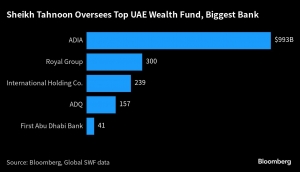
Sheikh Tahnoon was handed control of Abu Dhabi Investment Authority following a reshuffle in March. Days later, UAE ruler Sheikh Mohammed bin Zayed – known as MBZ – named his eldest son Sheikh Khaled bin Mohammed as crown prince and thus heir, after having held the position open for a year.
The $993 billion ADIA is among the world’s largest wealth funds and ranks as the second-biggest spender on deals among regional peers since the start of 2022 – just behind Saudi Arabia’s Public Investment Fund, according to data from Global SWF. Sheikh Tahnoon’s other vehicles, including the secretive Royal Group, have splashed out billions more.
Still, Abu Dhabi’s financial heft hasn’t always been enough. First Abu Dhabi Bank PJSC, the lender overseen by Sheikh Tahnoon that weighed a bid for Standard Chartered, bought Bank Audi’s Egyptian unit in 2021. But a year later it withdrew a $1.2 billion bid for Egyptian investment bank EFG-Hermes after facing lengthy regulatory delays, Bloomberg has reported. In the case of Standard Chartered, getting a deal done was ambitious given the differences in the scale of the two banks. Regulatory approvals and compliance were also obstacles to a successful deal.
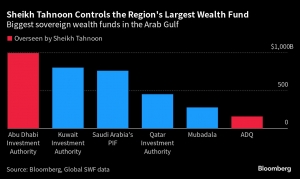
Luring Billionaires
The emirate remains a hub of deal-making, though, and Sheikh Tahnoon has been central to the city’s efforts at leveraging its expanding financial influence to draw more billionaires. Bridgewater Associates founder Dalio is setting up a branch of his family office in Abu Dhabi and partnering on deals with Sheikh Tahnoon, Bloomberg has reported.
As a diplomatic troubleshooter for his brother, the president, Sheikh Tahnoon has also helped his country push into geopolitically significant markets around the world. The UAE has signed a string of agreements to invest in Asian and African economies, including in Indonesia where G42 and Dalio have held discussions about partnering to help build the new capital city. Regionally, the royal has been at the forefront of investments in Egypt and, more recently, Turkey – where the Gulf country has pledged to pump in more than $50 billion.
“There’s definitely a geo-strategic component to some of Abu Dhabi’s overseas investment,” said Steffen Hertog, an associate professor at the London School of Economics. “Given Sheikh Tahnoon’s security background and role as high-level emissary in the MENA region in particular, you’d expect the funds under his control to incorporate such dimensions.”
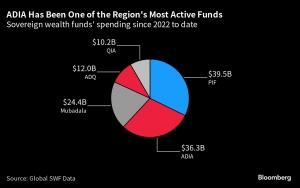
Bigger Than Goldman
Sheikh Tahnoon’s influence has, of course, been felt locally too. A key part of his empire is IHC, which has morphed into a $240 billion behemoth from an obscure fish farming firm in just a few years. It’s now twice the size of Goldman Sachs Group Inc. and Blackstone Inc, but that hasn’t enticed many international investors and IHC isn’t covered by analysts tracked by Bloomberg.
“IHC’s commitment to transparency is evident in its ‘day-to-day’ business activities, which include consolidating real estate assets and forming strategic collaborations that drive synergies and value,” CEO Shueb said in written comments. “These activities allow IHC to unlock new opportunities and maximize the potential of its assets on both local and international levels.”
The firm’s surging stock price has helped buoy the local bourse, which has rallied 92% since the start of 2020. In a period that saw investors flee emerging markets – the benchmark MSCI index is down about 11% – the Abu Dhabi Exchange, owned by ADQ, added over $600 billion to its market capitalization, which stood at about $750 billion as of the end of last week.
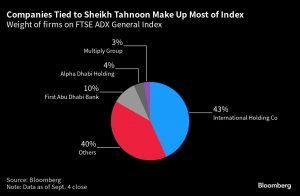
Some of those gains came on the back of deals involving the royal’s private holdings and the sovereign wealth funds he oversees. The latest example, which involved ADQ and IHC, created a $12 billion real estate behemoth. Earlier this year, the two firms also inked a partnership with the $73 billion private equity giant General Atlantic on a new venture to invest in alternative assets.
Sheikh Tahnoon’s “financial vehicles also serve to create new entities that generate wealth for next generation members of the ruling family and to secure the dominance of state-related entities within a wider market system,” Columbia University’s Young said.



















